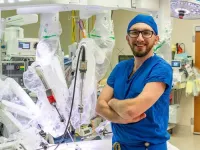(Press-News.org) A 240-year-old drug called digoxin could save the National Health Service (NHS) at least £100 million each year when treating older patients with atrial fibrillation and heart failure. This was compared to usual treatment with a beta-blocker according to a new study from the University of Birmingham, the city where digoxin was first used in 1785.
In a paper published in the journal Heart, researchers conducted an economic analysis on a clinical trial called RATE-AF to look at the differences between two widely used drugs for older patients with a common heart rhythm disorder called atrial fibrillation (AF) and symptoms of heart failure.
The RATE-AF trial, funded by the National Institute for Health and Care Research, included 160 patients and randomly assigned them to receive digoxin or beta-blockers for 12 months. An economic analysis was conducted to work out cost-effectiveness.
Among the patients who received digoxin, there were substantially less adverse events than with beta-blockers, including lower rates of hospital admission and general practice reviews for heart health. This resulted in an average cost saving of £530 per-patient per-year with digoxin. Extrapolating these results to the UK NHS, the researchers identified a potential cost saving of £102 million per year, which represents nearly 6% saving on the £1.7 billion spent annually on atrial fibrillation.
Professor Sue Jowett, Deputy Head of the Health Economics Unit at the University of Birmingham and corresponding author of the study commented:
“This study highlights the importance of health economic assessments and the role they can play to deliver appropriate treatments within the health service. At the usual £20,000 per quality-adjusted life year threshold, the probability of digoxin being cost-effective compared to beta-blockers was 94%, which could lead to substantial savings if the trial results were adopted more broadly in this population.”
Professor Dipak Kotecha from the Department of Cardiovascular Sciences at the University of Birmingham and the chief investigator of the trial said:
“Heart conditions such as atrial fibrillation and heart failure are expected to double in prevalence over the next few decades, leading to a large burden on patients as well as substantial impact on health systems around the world. Despite being one of the oldest drugs in use for heart disease, this study confirms an important role for digoxin in the management of these patients, providing safe and cost-effective treatment.”
END
240-year-old drug could save UK National Health Service £100 million a year treating common heart rhythm disorder
Health economic analysis shows digoxin leads to fewer adverse events which could free up hospital beds
2025-01-31
ELSE PRESS RELEASES FROM THIS DATE:
Detections of poliovirus in sewage samples require enhanced routine and catch-up vaccination and increased surveillance, according to ECDC report
2025-01-31
Between September and December 2024, four countries in the EU/EEA (Finland, Germany, Poland, Spain) and the United Kingdom reported detections of circulating vaccine-derived poliovirus type 2 (cVDPV2) in sewage samples. This is the first time cVDPV2 has been detected in EU/EEA countries from environmental surveillance.
To date, no human polio cases have been reported and the EU/EEA continues to be polio-free, but such findings call for increased vigilance.
Laboratory analyses likely indicate that the virus has been repeatedly introduced from an unknown area where that specific form of the virus is still in circulation. These recent importations may pose a threat to public ...
Scientists unlock ice-repelling secrets of polar bear fur for sustainable anti-freezing solutions
2025-01-31
Polar bear fur’s natural ability to resist ice formation could pave the way for safer, more sustainable solutions to prevent ice buildup across industries such as aviation and renewable energy, according to researchers at the University of Surrey.
An international study published in Science Advances has explored the anti-icing properties of polar bear fur in extreme Arctic conditions, revealing a unique mix of lipids in the fur’s sebum – an oily substance produced by the skin - that drastically reduces ice adhesion. ...
Ear muscle we thought humans didn’t use — except for wiggling our ears — actually activates when people listen hard
2025-01-31
If you can wiggle your ears, you can use muscles that helped our distant ancestors listen closely. These auricular muscles helped change the shape of the pinna, or the shell of the ear, funneling sound to the eardrums. Millions of years ago, our ancestors stopped using them, so humans’ auricular muscles are only vestigial. But now scientists examining the function of these muscles have discovered that they activate when we’re trying to listen to competing sounds.
“There are three large muscles which connect the auricle to the skull and scalp and are important for ear ...
COVID-19 pandemic drove significant rise in patients choosing to leave ERs before medically recommended
2025-01-31
Researchers have long known that patients who leave emergency departments before medically advised use more emergency care services, are more likely to be readmitted to the hospital and face higher costs of care—as well as increased mortality rates.
Until now, however, little has been known about national, multi-year trends, including the impact of the COVID-19 pandemic on this phenomenon.
“In addition, most studies have focused on specific subgroups of patients, such as those with stroke or those with appendicitis who leave after surgery,” said Elena Andreyeva, PhD, a faculty member with the Texas A&M University School of Public ...
Burn grasslands to maintain them: What is good for biodiversity?
2025-01-31
As grasslands get abandoned, controlled burning is discussed as a labor-saving method of keeping forests at bay. A Kobe University research team found that this method results in higher biodiversity and a higher prevalence of endangered plant species in some grasslands compared to others, depending on what soils they grow on.
Humans have been keeping grasslands since millennia by grazing, mowing and controlled burning, all of these are means to keep forests from overgrowing the grasslands. Grazing and mowing are, however, labor intensive and as rural areas become increasingly depopulated, grasslands have been disappearing worldwide. One consequence ...
Ventilation in hospitals could cause viruses to spread further
2025-01-31
Increased use of ventilation and air cleaners, designed to mitigate the spread of viral infections in hospitals, is likely to have unpredictable effects and may cause viral particles to move around more, according to a new study from researchers at UCL and UCLH.
In the study, published in Aerosol Science & Technology, researchers investigated the effect of using built-in mechanical ventilation and portable air cleaners (PACs)1 upon the spread of airborne particles, which are similar to those breathed ...
New study finds high concentrations of plastics in the placentae of infants born prematurely
2025-01-30
UNDER EMBARGO UNTIL: Jan. 30, 2025, 3:30 p.m. MST
Media Contact: Karen Addis, APR, karen@addispr.com, +1 (301) 787-2394
Denver, Colo. ― Microplastics, which are less than 5 millimeters, and nanoplastics, which are invisible to the naked eye, are widespread throughout our environment. Research has shown that exposure to plastics in general is harmful to both the environment and humans.
Now, in a new study to be presented today at the Society for Maternal-Fetal Medicine’s (SMFM) annual meeting, The Pregnancy Meeting™, researchers will unveil findings that suggest that microplastics and nanoplastics have been found ...
New robotic surgical systems revolutionizing patient care
2025-01-30
SALT LAKE CITY— Huntsman Cancer Institute at the University of Utah (the U) proudly announces the addition of two da Vinci 5 robotic surgical systems. This state-of-the-art technology is designed to enhance precision, control, and safety during minimally invasive surgeries, setting a new standard in patient care. These advancements align with Huntsman Cancer Institute’s focus on successfully delivering world-class cancer care through innovative treatments.
“This is a significant leap forward in robotic surgery,” says Brian Mitzman, MD, MS, FACS, FCCP, Huntsman ...
New MSK research a step toward off-the-shelf CAR T cell therapy for cancer
2025-01-30
CAR T cell therapy is one of the most promising new cancer treatments to emerge in recent years. It involves removing a patient’s own immune T cells and engineering them to recognize specific targets on the surface of the cancer cell.
A major limitation of this type of CAR T cell therapy, called autologous therapy, is that the cells are taken from the patient and must be custom-made into a treatment. This requires patients to wait until their cells are modified for infusion — precious time they may not have.
Now research done at Memorial Sloan ...
UTEP professor wins prestigious research award from American Psychological Association
2025-01-30
EL PASO, Texas (Jan. 30, 2025) – Health sciences researcher Emre Umucu, Ph.D., associate professor and associate dean for research at The University of Texas at El Paso, has been awarded the Roger G. Barker Distinguished Research Contribution Award from the American Psychological Association (APA). The award honors research in the field of rehabilitation psychology, which focuses on helping individuals with disabilities and chronic conditions improve their health, independence and social participation.
“I am ...
LAST 30 PRESS RELEASES:
Blood test “clocks” predict when Alzheimer’s symptoms will start
Second pregnancy uniquely alters the female brain
Study shows low-field MRI is feasible for breast screening
Nanodevice produces continuous electricity from evaporation
Call me invasive: New evidence confirms the status of the giant Asian mantis in Europe
Scientists discover a key mechanism regulating how oxytocin is released in the mouse brain
Public and patient involvement in research is a balancing act of power
Scientists discover “bacterial constipation,” a new disease caused by gut-drying bacteria
DGIST identifies “magic blueprint” for converting carbon dioxide into resources through atom-level catalyst design
COVID-19 vaccination during pregnancy may help prevent preeclampsia
Menopausal hormone therapy not linked to increased risk of death
Chronic shortage of family doctors in England, reveals BMJ analysis
Booster jabs reduce the risks of COVID-19 deaths, study finds
Screening increases survival rate for stage IV breast cancer by 60%
ACC announces inaugural fellow for the Thad and Gerry Waites Rural Cardiovascular Research Fellowship
University of Oklahoma researchers develop durable hybrid materials for faster radiation detection
Medicaid disenrollment spikes at age 19, study finds
Turning agricultural waste into advanced materials: Review highlights how torrefaction could power a sustainable carbon future
New study warns emerging pollutants in livestock and aquaculture waste may threaten ecosystems and public health
Integrated rice–aquatic farming systems may hold the key to smarter nitrogen use and lower agricultural emissions
Hope for global banana farming in genetic discovery
Mirror image pheromones help beetles swipe right
Prenatal lead exposure related to worse cognitive function in adults
Research alert: Understanding substance use across the full spectrum of sexual identity
Pekingese, Shih Tzu and Staffordshire Bull Terrier among twelve dog breeds at risk of serious breathing condition
Selected dog breeds with most breathing trouble identified in new study
Interplay of class and gender may influence social judgments differently between cultures
Pollen counts can be predicted by machine learning models using meteorological data with more than 80% accuracy even a week ahead, for both grass and birch tree pollen, which could be key in effective
Rewriting our understanding of early hominin dispersal to Eurasia
Rising simultaneous wildfire risk compromises international firefighting efforts
[Press-News.org] 240-year-old drug could save UK National Health Service £100 million a year treating common heart rhythm disorderHealth economic analysis shows digoxin leads to fewer adverse events which could free up hospital beds


